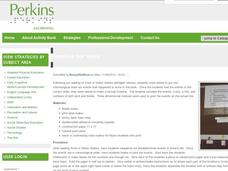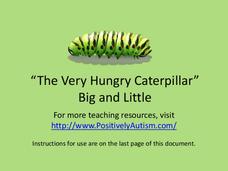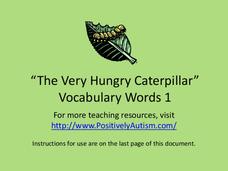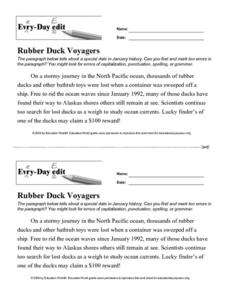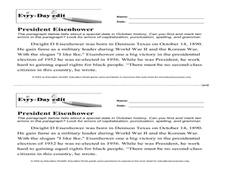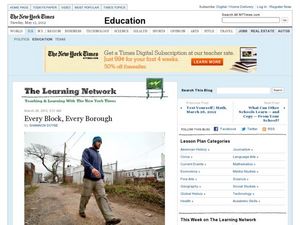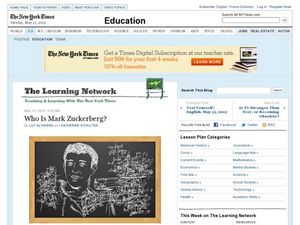Perkins School for the Blind
Timeline for Anne
It is key to the learning process to make everything a child with visual impairments does as tactile as possible. After reading Anne of Green Gables, the class discusses her life events in order to make a tactile time line. They choose...
Positively Autism
The Very Hungry Caterpillar Big and Little Activity
A big caterpillar, a little caterpillar. A big butterfly, a little butterfly. Images from Eric Carle's The Very Hungry Caterpillar model for learners with autism the difference between big and little.
Positively Autism
The Very Hungry Caterpillar Vocabulary
Moon, eggs, leaf, sun, caterpillar. Prior to reading Eric Carle's classic tale, introduce vocabulary for The Very Hungry Caterpillar with these picture cards that also include the vocabulary word printed in large type.
Education World
Every-day Edit: Rubber Duck Voyagers
Learners correct errors in spelling and usage in a quick, six-line proofreading exercise. Makes a nice warm-up and reinforces editing skills. I've seen work like this called Daily Oral Language (D.O.L) practice; the class reviews the...
Education World
Every-day Edit: Hobo Turned Poet
Pupils proofread a short paragraph about Carl Sandburg. The errors span capitalization, punctuation, spelling, and grammar. Useful as a warm-up and language conventions review. Go over it together as a class verbally and have individual...
Education World
Every Day Edit - Sir Isaac Newton
Practice everyday! Have learners correct grammatical errors in a short paragraph about Sir Isaac Newton. The errors are in capitalization, punctuation, spelling, and grammar.
Education World
Every Day Edit - President Eisenhower
What do you know about Dwight D. Eisenhower? Learn about President Eisenhower while editing a half-sheet. Learners correct grammatical and spelling mistakes in the short paragraph.
Curated OER
Goal Setting
Students understand how they can incorporate dietary guidelines in their daily life. In this investigative lesson students set dietary goals and incorporate an activity to learn how to create a new seed variety while studying dispersal...
Curated OER
When Is a Noun a Verb? Examining Double Duty Words
The New York Times' Learning Network provides great lessons! This one uses articles from the paper to help readers understand homonyms like mail (verb and noun). It also includes an exercise in reading informational text. Links to the...
Curated OER
Suspended 1,353 Feet Up
With a series of pictures you are transported to Chicago's Skywalk. Read about this magnificent tourist attraction and answer the reading comprehension questions provided. Extend this activity by having your class write about other...
Curated OER
What Science Suggests About 'Weather Weirding'
Here is an activity that you can use to help upper elementary or middle schoolers to meet Common Core literacy standards for science and technology. Youngsters read the article on extreme weather patterns, "Weather Runs Hot and Cold, So...
Curated OER
On the Dots
If you want your class to practice reading informational texts and answering related questions, this short exercise from The New York Times' "Learning Network" might be helpful. It includes an article on Dippin' Dots and uses...
Curated OER
Mission Complete, Houston
It was a bittersweet event when the space shuttle Atlantis touched down for the last time on July 21, 2011. Space science learners read an article about this event in The New York Times and then write answers to who, what, where, when,...
Curated OER
Where the Books Are
The news is full of interesting stories and ideas shared in an informational style. Readers use the provided who, what, when, where, and why questions as they explore an article about a man who is passionate about archiving physical...
Curated OER
"Every Block, Every Borough"
From the New York Times Learning Network series, this learning exercise poses 10 questions on an article entitled, "Leaving His Footprint on the City" about a man planning to walk every street in all five New York boroughs. The prompts...
Curated OER
Who is Mark Zuckerberg?: Reading Informational Text
This New York Times "Learning Network" exercise provides 10 questions that apply to an article about Mark Zuckerberg. It poses key journalistic questions like, who, what, why, where, how, and when. This resource provides a nice, short...
Curated OER
Reading about Recent Exhibits in the Art and Design Section
A large part of analyzing or understanding art is knowing how to read about it. The New York Times has put together these who, what, where, when, and how questions to aid learners in comprehending informational pieces related to art and...
Curated OER
2011 Nobel Prize Winners Announced
This assignment has young scientists read four different news articles about the 2011 Nobel Prize winners. Six questions are posed for children to write the answers. It is a relevant activity for getting middle schoolers to meet the...
Curated OER
Big Branding on Campus: Reading Informational Text
This New York Times "Learning Network" activity poses 11 questions on an article and video about commercial branding and marketing on college campuses. The related article, "On the Market: Thinking Critically About Advertising", is...
Curated OER
The New YouTube
Can you guess how many hits YouTube gets in one day? If you said two billion, you're wrong. If you said three billion, you're getting closer, but you're still over a billion hits away! Use this article to bring current events into the...
Positively Autism
Trace the Train Track!
Learners with autism develop their fine motor skills with an activity that asks them to trace Travis the Train's track
Prestwick House
Discovering Genre: Poetry
Work on literal and figurative meanings with a lesson plan focused on Robert Frost's "After Apple-Picking" and "The Road Not Taken." Readers identify the literary devices used by the poet to set the poems' themes, settings, and narrative...
Teaching Tolerance
Community Bulletin Board
A project-based lesson has pupils create a bulletin board to share artwork, nonfiction articles, and messages based on social justice themes. The finished board is displayed in the community to create a place for discussion.
Curated OER
Exploring Media: Understanding and Identifying Editorial Perspective in Television and Radio News
Students research the topics Boat People: A Refugee Crisis, Dr. Henry Morgentaler: Fighting Canada's Abortion Laws, and CANDU: The Canadian Nuclear Reactor on the CBC Radio and Television Archives Web site.
Other popular searches
- Class Newsletter
- Bill of Rights Newsletter
- Creating a Newsletter
- Newsletter Template
- Classroom Newsletters
- Autobiographies Newsletter
- Creating Newsletter
- Newsletter Writing
- Writing a Family Newsletter
- Back to School Newsletters
- Newsletter on Computer
- Student Newsletters


